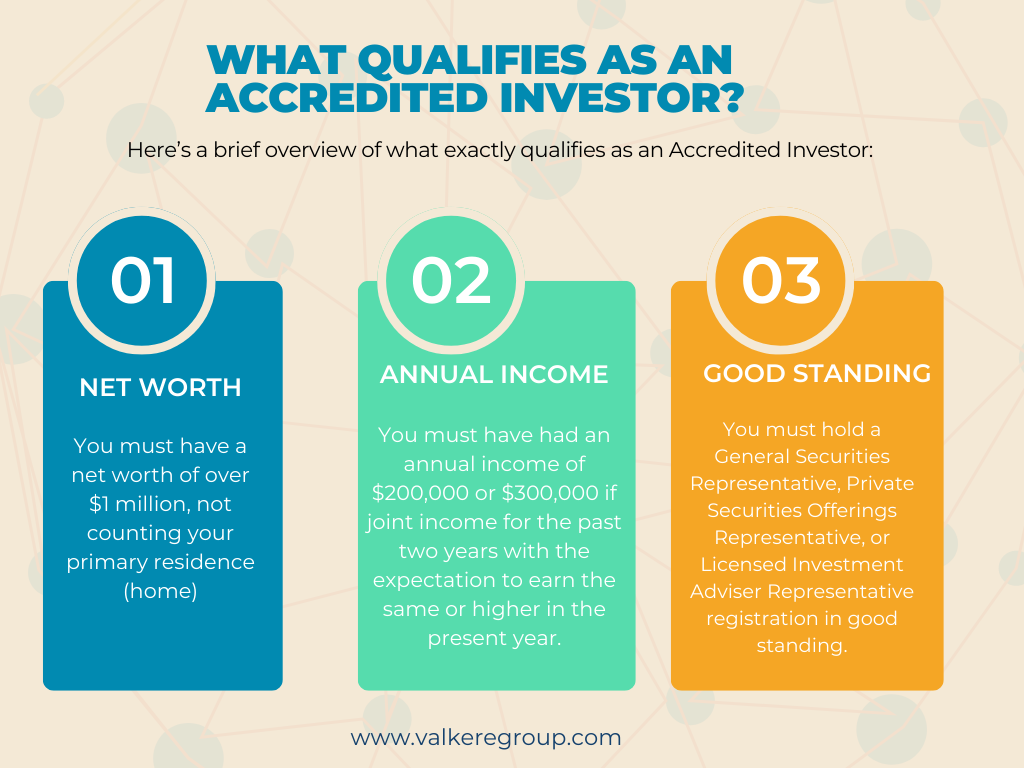All Categories
Featured
Table of Contents

It's critical to understand that accomplishing accredited capitalist status is not a single success. People need to keep their eligibility by satisfying the recurring requirements developed by governing bodies. Routine assessment of revenue, internet worth, and specialist credentials is essential to ensure ongoing accreditation. It's consequently essential for certified financiers to be positive in checking their financial scenario and upgrading their records as essential.
Failing to meet the ongoing criteria might result in the loss of certified financier status and the associated benefits and opportunities. While much of the investment kinds for Accredited Financiers are the very same as those for any person else, the specifics of these investments are commonly various. Private positionings refer to the sale of safeties to a select team of accredited investors, typically beyond the general public market.
Hedge funds goal to supply favorable returns no matter market problems, and they typically have the flexibility to invest across various asset classes. Exclusive equity investments, on the other hand, include buying privately-held firms that are not publicly traded on stock market. Private equity funds pool capital from certified investors to get possession stakes in companies, with the objective of enhancing efficiency and generating considerable returns upon departure, generally via a sale or going public (IPO).
Market fluctuations, building administration difficulties, and the potential illiquidity of realty possessions need to be carefully evaluated. The Stocks and Exchange Payment (SEC) plays a vital function in regulating the tasks of accredited financiers, that must stick to especially laid out guidelines and coverage needs. The SEC is in charge of implementing safeties regulations and policies to protect investors and keep the honesty of the financial markets.
Trusted Accredited Investor Alternative Investment Deals
Guideline D supplies exceptions from the registration requirements for sure personal positionings and offerings. Recognized capitalists can take part in these exempt offerings, which are generally extended to a limited number of advanced investors. To do so, they should offer accurate details to issuers, total essential filings, and comply with the rules that govern the offering.
Compliance with AML and KYC needs is vital to preserve standing and get to various investment chances. Stopping working to adhere to these policies can result in extreme penalties, reputational damages, and the loss of accreditation privileges. Let's unmask some usual misunderstandings: An usual misunderstanding is that recognized capitalists have actually a guaranteed benefit in regards to financial investment returns.
Best Accredited Investor Real Estate Deals for Financial Freedom
Yes, certified financiers can lose their standing if they no more meet the qualification criteria. For instance, if a recognized investor's earnings or total assets drops below the marked limits, they may lose their certification - accredited investor syndication deals. It's vital for accredited investors to routinely evaluate their monetary circumstance and report any adjustments to ensure compliance with the laws
Some financial investment chances may permit non-accredited investors to participate through particular exemptions or stipulations. It's important for non-accredited financiers to thoroughly review the terms and conditions of each financial investment opportunity to determine their eligibility. exclusive deals for accredited investors.
Top Accredited Investor Funding Opportunities

If you want to invest in specific complicated financial investments, the Securities and Exchange Compensation (SEC) calls for that you be a recognized capitalist. To be accredited, you must meet specific needs regarding your riches and income along with your financial investment expertise. Have a look at the basic requirements and benefits of coming to be a recognized investor.
The SEC takes into consideration that, due to the fact that of their monetary security and/or financial investment experience, accredited capitalists have much less need for the defense offered by the disclosures needed of controlled investments. The rules for certification, which have remained in place given that the Securities Act of 1933 was developed as a feedback to the Great Clinical depression, can be discovered in Law D, Guideline 501 of that Act.
First-Class Top Investment Platforms For Accredited Investors for High Returns
That company can't have actually been formed simply to purchase the non listed securities in inquiry. These requirements of earnings, web well worth, or professional experience ensure that inexperienced investors do not run the risk of money they can not manage to shed and don't take economic threats with financial investments they do not recognize. No actual certification is available to verify your condition as a recognized financier.
Neither the SEC neither any kind of various other regulatory firm is associated with the process. When you look for certified financier status, you're most likely to undertake a screening process. You might need to complete an initial questionnaire inquiring about your financial investment history, income, and total assets. Files you will possibly need to create may consist of: W-2s, income tax return, and various other papers validating incomes over the past two years Monetary statements and financial institution declarations to validate net worth Debt reports Paperwork that you hold a FINRA Collection 7, 64 or 82 classification Documents that you are a "experienced worker" of the entity releasing the safeties The capacity to spend as a "educated employee" of a fund issuing securities or as a monetary professional holding an appropriate FINRA license is new since 2020, when the SEC increased its interpretation of and certifications for accredited financiers.
Reputable Accredited Investor Platforms

These safeties are unregistered and uncontrolled, so they do not have offered the regulative securities of licensed protections. As a whole, these financial investments might be particularly unstable or lug with them the potential for significant losses. They include numerous organized investments, hedge fund financial investments, private equity financial investments, and other private positionings, every one of which are uncontrolled and might bring significant risk.
Of course, these investments are likewise attractive since in addition to included danger, they lug with them the potential for substantial gains, typically more than those available by means of ordinary financial investments. Approved financiers have offered to them investments that aren't open up to the public. These financial investments include personal equity funds, angel financial investments, specialty investments such as in hedge funds, equity crowdfunding, property financial investment funds, financial backing investments, and direct investments in oil and gas.
Business supplying non listed securities only have to supply paperwork about the offering itself plus the location and policemans of the firm providing the safety and securities (passive income for accredited investors). No application process is needed (as is the case with public supply, bonds, and mutual funds), and any kind of due persistance or additional information supplied is up to the business
Personalized Exclusive Deals For Accredited Investors
This info is not planned to be specific advice. Potential participants should seek advice from with their personal tax obligation professional relating to the applicability and impact of any kind of and all benefits for their very own individual tax scenario. In addition, tax obligation laws transform periodically and there is no guarantee pertaining to the analysis of any tax obligation regulations.
Accredited financiers (in some cases called competent financiers) have access to investments that aren't available to the public. These investments might be hedge funds, difficult cash financings, exchangeable investments, or any other security that isn't registered with the economic authorities. In this short article, we're mosting likely to focus specifically on property investment options for recognized financiers.
Table of Contents
Latest Posts
Tax Foreclosure List
Investing In Real Estate Tax Liens
Homes Tax Foreclosure
More
Latest Posts
Tax Foreclosure List
Investing In Real Estate Tax Liens
Homes Tax Foreclosure